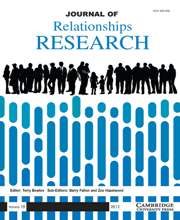Article contents
Relationship Efficacy and Relationship-Related Attitudes
Published online by Cambridge University Press: 17 April 2018
Abstract
The purpose of this study was to examine the connection between relationship efficacy and other relationship-related attitudes. The sample consisted of 211 participants who were given measures of relationship efficacy, sociosexuality, and attitudes toward consensual non-monogamy. Results demonstrated a negative relationship between efficacy and views on non-monogamy, a negative relationship between efficacy and sociosexuality, and a difference in efficacy between those who were and were not in a relationship at the time of the study. Relationship efficacy is important to examine, as our beliefs about our capabilities are likely to influence our future success.
- Type
- Research Article
- Information
- Copyright
- Copyright © The Author(s) 2018
References
- 2
- Cited by




